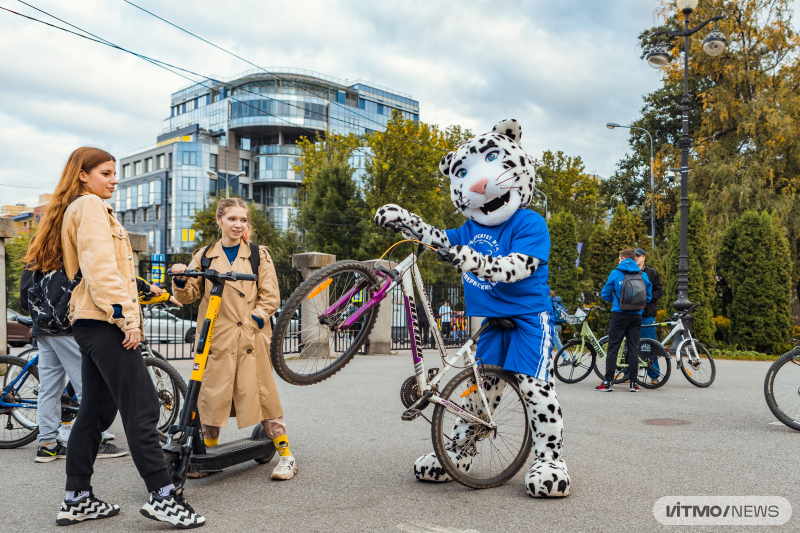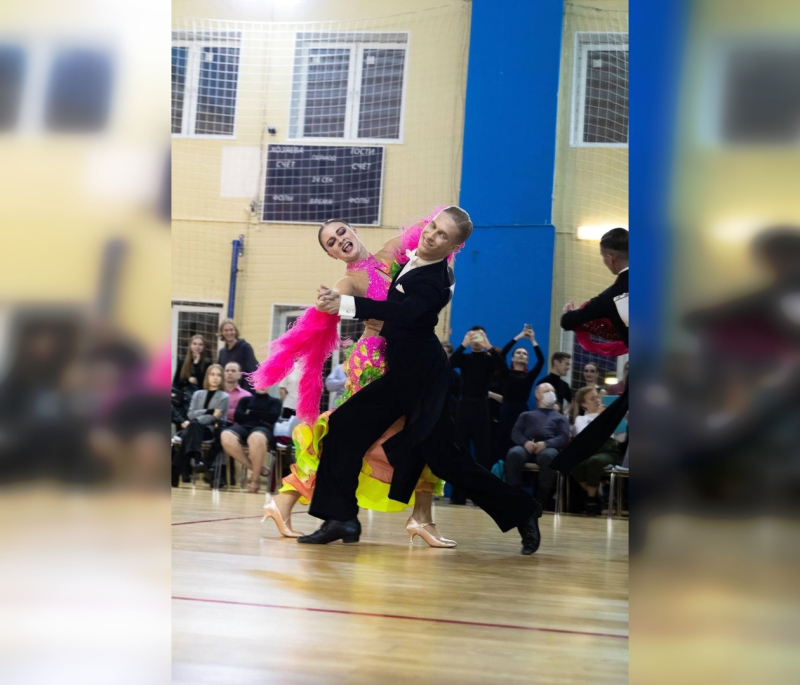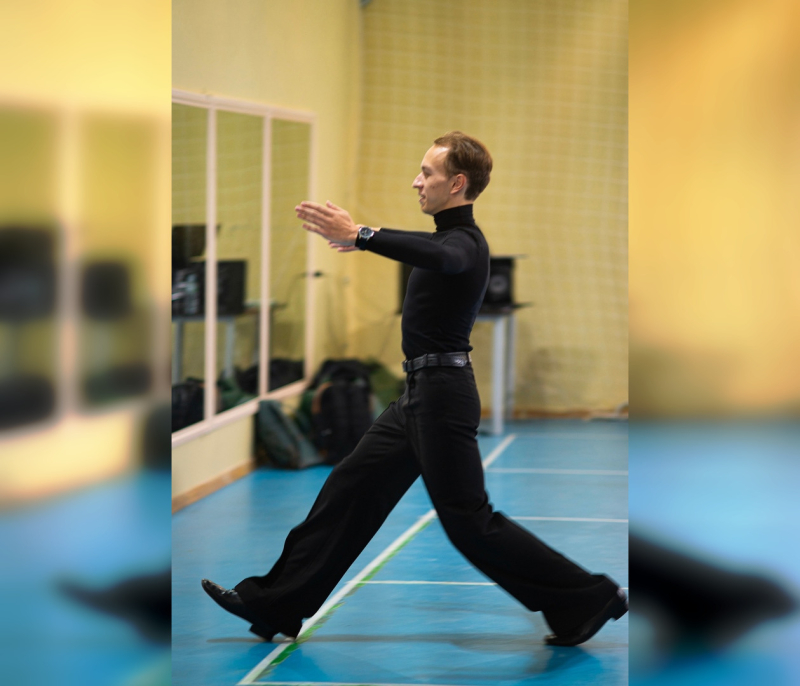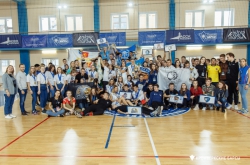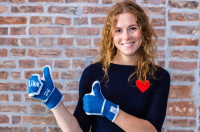Arina and Ilya, both students at ITMO, are ballroom dancing instructors at KronBars. The club’s team holds second place in the St. Petersburg dancing tournament. To them, it's more than just sports – it's a passion.
How did you get into ballroom dancing?
Arina: It’s all thanks to my mom, who brought me to a sports school when I was four. Later, her passion for ballroom dancing grew into my admiration for the sport.
Ilya: I don’t really remember. It happened when I was a child, some 16 years ago. I think I heard about the sport, visited my local ballroom dancing club, and stayed because I liked it.
What’s the coolest thing about your job?
Ilya: These days, I get to work mostly with amateur athletes who decided to get into dancing at university. This year, I am training my second batch of students, and those who I worked with last year are already at the same level as our more experienced members, who’d had some dance training before they came to ITMO. I think seeing your students grow has to be one of the best things about being a teacher.
In some ways, my classes this year are different from the ones I taught previously, which I can see in the skills of my students: they do certain things better than my previous group, while in other things they are a little weaker. This is curious to notice – you can see how you can influence the performance of your students with your teaching style.
Arina: Showing people that anyone can get the basics of dancing. And seeing the burning passion of my students, answering hundreds of questions, and witnessing their growing excellence. This is all priceless.
What other sport would you have picked if dancing wasn’t an option?
Arina: I think I might have opted for swimming or biathlon. Although music and art in general truly feed my soul, so maybe I would’ve chosen figure skating or ballet.
Do you get the chance to pursue other interests apart from dancing?
Ilya: Apart from dancing, I also study and work within my field. Even though we have regular training sessions, working at the club doesn’t take up so much time that you can’t easily combine it with studies and any other activities.
Share one item on your bucket list.
Arina: To find the source of your happiness and learn to see the beauty within and all around you.
Ilya: I would say to create something that will be beneficial for others and will be able to develop further even without my contribution.
What’s the best piece of advice for an amateur in your sport?
Ilya: Just like with any studies, here you have to pay attention to detail, stay active, and have the discipline to train on your own.
Arina: Watch as many professional performances, live or recorded, as you can. The more we watch, the better we can visualize, the easier we see how each movement unfolds. It is also important to ask questions of your teacher and set time aside to polish your moves on your own.
Where do you look for a second wind?
Arina: I believe that you have to take a pause and recharge before moving forward. It’s especially important in sports. You also need to analyze your experiences and look for new ways towards your dreams.
How does one get off the couch and start working out?
Ilya: You need to find your motivation, which, thankfully, is quite an easy task these days. For instance, with dancing you can just find recordings of world championships – you can’t help but get up and practice your movements afterward. The key thing here is to actually start doing something once you’ve kindled your motivation.
Arina: There is no single recipe; rather, it all comes down to your desire to change, get better, and take care of yourself. Just ask yourself: what do I want to be like and why am I not chasing my dreams now?
How do you stay in shape?
Arina: I trust my intuition with everything food- and exercise-related. If I don’t want to do something today, I never blame myself – it’s okay, it just means that the motivation will come tomorrow. For me, staying in shape means listening to my body.
Ilya: I don’t only teach others, but also participate in classes along with other experienced dancers in the club. There, we focus on both theory and practice, which helps me maintain my shape.
What’s your inspiration?
Arina: Art and love. Also, my friends, competitions, childhood memories, shows, and just walks around the city – finding new experiences and ideas, that’s the true inspiration.
Ilya: In dancing – other athletes, both my students and those who are more advanced than me.
Stanislav is fencing and ultimate frisbee coach at KronBars. Both of his clubs regularly represent ITMO in Russian and international tournaments. He believes sports can transform your life.
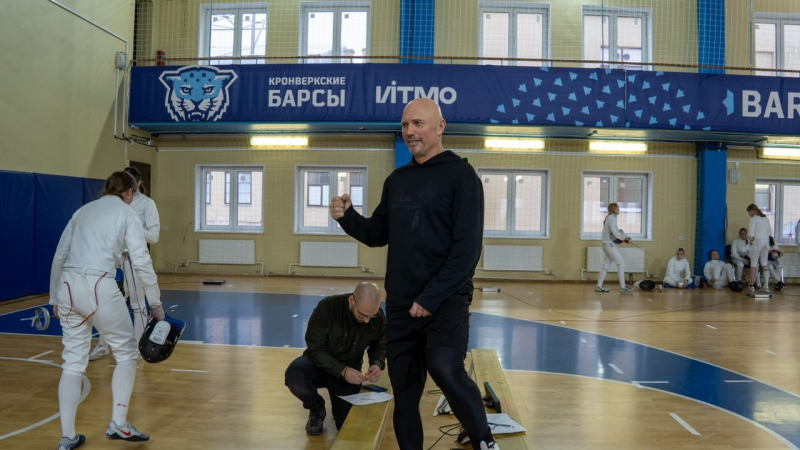
Stanislav at the recent ITMO open fencing championship. Photo courtesy of the subject
How did you get into fencing? When did ultimate frisbee come into the picture?
I have been fencing for most of my life. It was a simple decision: I have always been drawn to martial arts because they combine many different aspects, including functional training, teamwork, and elements of a game. These are present in various combinations in different sports, but for me the martial arts combine it all. And fencing also has these traits, but it’s more intellectual and less likely to result in serious injuries, which means that you can actually do it your whole life. As for ultimate frisbee, I originally became interested in the sport because it could be beneficial in developing the skills necessary for fencing in beginner-level athletes, and then I came to appreciate it in its own right.
What’s the coolest thing about your job?
I’d say the feeling you get when you are practicing. Also, the way that sports and regular training can dramatically transform your life. Anyone who is practicing sports is living a different life from someone who isn’t. Sports shape your personality; they are actually one of the major ways to do it. You can always tell if a person is an athlete, sometimes even without talking to them: by their posture, their movements, their reaction speed, etc.
Could you share one thing on your bucket list?
I think everyone has their own bucket list. But I believe that the one thing everyone has to do is catch their chance to do something they might not have the chance to do later. If you feel that you’ve been missing out on something that you absolutely want to do in life, act then and there, don’t wait until it’s too late. Being a student, you have the best opportunity to catch your chance by its tail.
What’s the best piece of advice for an amateur in your sport?
First and foremost, ask yourself why you need it. I don’t believe there is any kind of sport that you do purely for yourself. Performance is a vital element of it – we always work to achieve a certain result. So, ask yourself what is that result that you want to achieve.
Where do I look for my second wind?
There’s not just the second – there are also the sixth and even seventh winds, although we very rarely achieve this state, as it would require extreme conditions. And doing sports isn’t about extremes, it’s about daily hard work. So it all comes down to the goal you are chasing.
How can I get off the couch and start working out?
Find your sport and find a good coach. Your best results lie in a discipline that is aligned with your physical abilities, and you are always after some results, even if you don’t admit it to yourself. And a good coach is someone who is interested in working with you. Also, one lifehack: don’t ever choose to pay for your classes. I believe that only professional sports classes at the highest level can be paid for – otherwise, you should be training at various schools and clubs that offer classes for free.
How do you stay in shape?
The older you get, the more you should be training if you want to grow your skills. At 25, it may be enough to practice four times a week, and at 50 it’s not a given that you will improve even with daily practice. The length of your training session is also important: for instance, 1.5 hours isn’t enough for you to actually unravel your potential. When it comes to professional sports, one session can last up to four hours. And there might be nine of those per week.
What’s your inspiration?
People. Everything we do, we do for people. It’s true that sometimes we might not like people, but whatever we do, we do for them, so I believe it’s the ultimate source of inspiration.
Doing sports with KronBars is how you get your PE credit as a Bachelor’s student – or stay in shape and perform in tournaments as a Master’s student. You can learn more about how to sign up for a sports club here or by visiting the club’s official website. And if you wish to see what other unusual sports are on offer at KronBars, check out our interview with the manager of the club's esports division.
